published: 4 /
5 /
2024
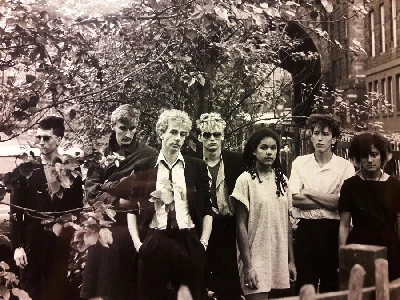
Keyboardist Allan Dumbreck talks to John Clarkson about his Edinburgh-formed post-punk outfit Autumn 1904's return forty years after they broke up and the recent release of their album. 'Tales of Innocence'.
Article
“In the 1980s, you got a window, three to six months to capitalise on something like that,” says Allan Dumbreck, before adding simply. “And we didn’t!”
It is a Saturday lunchtime, and Dumbreck is sitting in an Edinburgh coffee shop, talking to Pennyblackmusic about the frankly remarkable return of his 80’s post-punk band Autumn 1904 after an absence of forty years.
The seven-piece Autumn 1904, which consisted of band leader Dumbreck (keyboards), Ross Thom (guitar), Billy Bowie (bass), Keith Falconer (drums), Billy Leslie (lead vocals) and Indira Sharma and Lisa Cameron (backing vocals), had eleven record labels jockeying to sign them after they recorded a memorable John Peel Session in February 1984. Victims of fate and bad fortune, they, however, swiftly fell apart and disintegrated.
After Autumn 1904 broke up, Allan Dumbreck spent some time doing live session work for Scottish acts such as The Big Dish, Horse and The River Detectives before moving into music education.
He co-created with Love and Money’s Paul McGeechan (whose Starless project will be the subject of a Pennyblack interview next month) and Deacon Blue’s James Prime the BA course in Commercial Music at the University of the West of Scotland, where he has worked as a senior lecturer for many years. He has also co-authored with Gayle McPherson a book ‘Music Entrepreneurship’ on the subject, and has another one in the pipeline for later this year, his co-author this time being former Belle and Sebastian and Bis manager John Williamson.
“I don’t want younger people in bands to go through the assault course of errors, difficulties, problems that we had been through,” he says. “Pretty much everyone I know who had been in bands in the ‘80s all say the same thing. If we had known then what we know now, we would be a lot more successful and a lot richer.”
Autumn 1904 were short-lived. Formed in 1982, they were part of the fertile mid-80’s Edinburgh live scene that also included Goodbye Mr Mackenzie and Finitribe. Beyond the Peel Session, they released in their original lifetime just one song, ‘I Heard Catherine Sing’, for a compilation for ‘Deadbeat’, a local fanzine.
Sharma and Cameron left in the summer of 1984, and Bowie, Thom and Falconer all also quit to join another local band The Crows in early 1985. Dumbreck and Leslie carried on in a new line-up for a few months. While she was never a member, they would occasionally be joined during this period at gigs by Garbage’s Shirley Manson, who was in Goodbye Mr Mackenzie at the time and would provide guest backing vocals. “She was always a phenomenal talent, even then,” recalls Dumbreck about Manson. Feeling, however, that they were getting nowhere, Autumn 1904 broke up in November 1985.
Now all these years later they are back. There is a gig planned for SWG3 in Glasgow at end of May, and an album, ‘Tales of Innocence’, has just been released on vinyl on Last Night From Glasgow. It consists of the four tracks from the John Peel Session, two long-lost demos, and four songs written in the 1980s but recorded by the band now. It is a powerful record, combining Dumbreck’s soaring keyboards with cascading guitars and Leslie, Sharma and Cameron’s sharp harmonies. Timeless, with its updated tracks and angst-torn, paranoiac lyrics which are as contemporary now in these turbulent times as they were back in the 1980s, it is one of the early great albums of 2024.
Allan Dumbreck is a natural-born raconteur and very funny, and the story of Autumn 1904 is life-affirming.
PB: Why have you decided to reform Autumn 1904 after such a long absence?
AD: I was clearing out my cupboards at home during lockdown, and I found some old Autumn 1904 cassettes and played them again and loved them. I had played them after the band split up for a while, but I hadn’t heard them in at least twenty years. Then I thought, “There are at least two or three good tracks on here. It would be great to put out a single” (Laughs).
So, I got in touch with the band. I found Keith and Ross in Glasgow, Billy the bass player was in Glasgow at that time but is now in London, and Billy Leslie the vocalist was just outside Glasgow but spends a lot of his time working abroad. I met up with them all, and we agreed that we would try and put a single or an EP out with some of the material that we had.
We started looking through the old tapes, and we hunted down various other tapes and got them all remastered, and I thought, “Could we get the BBC tapes? Do they still exist from the John Peel Session?”
I went to speak in early 2022 with Ian Smith from Last Night From Glasgow. They have cornered the market for re-releases and new albums by mainly Scottish bands of the 1980s and early 1990s. They have released albums by The Bluebells, Hipsway, Love and Money, It’s Immaterial and a whole bunch of other artists. I said to Ian, “You know what you are doing. I want to put a single out. How do I do this?” and Ian said, “Well, make some notes,” so I sat there for half an hour writing things down, and he advised me not to put out a single, but to put out an album, and told me how to get onto things like Radio 2. Then at the end of it said, “Tear those notes up and put them in the bin,” and I said, “Well, why?” “Because I will put your album out.” I said, “Why will you put the album out?” and he said, “Because it is a great story and we should be able to find the Peel Session.”
It took them until Christmas 2022 to hunt down the Peel Session. We thought that the Peel Session may have gone. I know people who have recorded BBC Sessions from ’81, ’82 and ’83 and they have all been scrapped. They don’t have them anymore, and my favourite Christmas present ever was on Christmas Eve 2022 when I got a text from Ian saying, “I have got your Peel Sessions.”
The album features two demos made at Peer House Studios in Edinburgh back in the 1980s, four songs from the John Peel Session and four songs that we have recorded now. It has taken three years from hunting the old material, recording the new material, remastering everything, sorting out the artwork and publishing and getting to the point where we can release it.
PB: How easy was it to find the band members, given that you had not been in touch for a long time?
AD: Facebook is really helpful and has been of huge value there. I found Keith the drummer first, and Keith thought he had a contact on Ross, and through Ross we got Billy Bowie the bass player. I can’t remember how we found Billy Leslie the vocalist again. This would have been much harder fifteen or twenty years ago before Facebook and social media.
PB: What do you make of this band of forty years ago all these years on?
AD: It is really interesting playing the tracks from back then. I have to say the tempo is really high. We used to rehearse three times a week and the whole thing is really fast. My first thought was that if we play a gig we might not be able to play at that speed anymore, but then when you are in your early twenties you just play at full tilt the whole time. I thought, however, that the songs, the songwriting and the playing stood up. The energy that comes off the tracks is still there.
The Peel Session and the Peer House demos were recorded back in the 1980s, but we wanted to record four new songs that were written in the 1980s but were never previously recorded.
One of those was a song called ‘Sister’ which Billy Bowie sang. The only recording we have of it is at a gig at the Dial Inn. which is a venue that no longer exists in Glasgow. That gig was recorded in late 1982, and it was recorded on an old cassette recorder/ghetto blaster, and the recording is of very poor quality. None of us could make out the lyrics. We had no idea what the lyrics were. Billy Bowie and I sat for hours in front of a tape recorder. and put lyrics together that we thought were appropriate, and Billy then sang them. To me, it is very close to what we have. It is not going to be perfect. You’re not going to be able to play s song from forty years ago exactly as you played it back then, but we captured the essence of it.
With ‘Motherland’, I feel if anything we captured it better than back in the day. Liam McCluskey, the producer that we worked with, has worked with Twin Atlantic and with Gun. I didn’t have a recording but I explained to him a lot of what I wanted for that song and he made it work. Liam deserves a lot of credit on the album for taking the sound we had had in our heads since the 1980s and making it actually happen. Ross, Billy, Keith and I sat around and said, “Oh My God. That’s it.” I love it. That is the sound I had had in my head for forty years and I finally heard it coming out of the speakers, which is an absolute joy.
PB: Where did the name Autumn 1904 come from?
AD: I met Ross through an advert found in a second-hand record store. We put the band together, and he came from very much an indie background, He was into Bauhaus, Magazine and a lot of guitar bands like that, whereas I was more into the synth bands like Ultravox! and Simple Minds, so we came from very different backgrounds.
Billy Bowie joined us as the vocalist initially. That is why he sings on ‘Motherland’ and ‘Sister’ and he is now singing on ‘The Blessing’ as well, but he took up the bass instead and we got Billy Leslie in. In the first, early incarnation of the band Billy was, however, the vocalist.
We got offered our first show supporting the Visitors. The Visitors were a big John Peel favourite. We shared a rehearsal room with them. Ross knew them, so we got to use their rehearsal room. They said, “We would like you to come along and do the gig,” and we said, “We don’t have a drummer,” and they said, “Our mate Keith plays the drums, so get him,” So we did and we rehearsed him up on the day and we walked on stage. We had never played with him before, and he counted us in, and I remember thinking, “This is either going to be the greatest thing in the world or a complete nightmare,” and it was brilliant and he was absolutely the right drummer for the band.
But a week before that gig The Visitors were starting to put posters up and were wanting to know the name of the band, and Billy Bowie said, “I know what we are going to call the band. We are going to call it Autumn 1904.”
The night before he had been out seeing friends in the centre of Edinburgh, and he had got on a night bus to go home to where he lived way out of town. He had a purple mohawk at that point and was used to people wanting to talk to him about his hair, but just wanted to get on the bus and go home. There was only one other guy on the bus, and he was about 80 years old, and he was sitting up the back of the bus, and giving him grief. “Oh son, son, you not talking to me, son,” and Billy was like, “Oh God! What do I do now?” So, he went up the back of the bus and sat with this guy for half an hour as this bus went very slowly through the streets of Edinburgh back to his flat. The only thing this guy said to him was “I was born in the Autumn of 1904. You were only born yesterday. You know nothing. I have seen wars. I have seen famine. I was born in the Autumn of 1904,” and Billy said, “It was going through my head. I didn’t get his name or what he did, just that he was born in Autumn 1904, so that’s what we call the band,” and Ross said, “Let’s just do it,” and I went, “Okay, fine.” So that’s where the name came from (Laughs).
PB: There is a real sense of paranoia to a lot of Autumn 1904’s lyrics and in particular ‘I Heard Catherine Sing’ and ‘The City’. Where does that come from?
AD: Billy Leslie wrote all the lyrics. The music was usually written from a combination of Ross and myself. We wrote a lot between us. On ‘Catherine’, for example, I wrote all the melodies and the girls’ parts and the chorus. I didn’t pay a lot of attention to Billy’s lyrics back in the day, but going back to them now I think that they are really special.
Billy Leslie was writing from the perspective of personal experience, his own personal experience of living in the city and of relationships and people that he knew. He told me at the time that ‘I Heard Catherine Sing’ was about a girl that he had been at school with, who had very tragically died in a road accident. He was walking down the road, and he either heard her voice or thought he saw her. It was just that momentary ghost thing. It was about that and how a death like that affects you and makes you assess your own life, because one minute she was there and the next she was gone. It makes you reevaluate things.
He had had experience - and I think most of us in the band had- of when we were young living in the city, you end up walking home one night, and you run into people who are shouting at you or chasing you down the road, or you turn a corner and there are two guys having a fight, and you think, “Should I get involved? How do I deal with this?” Cities can be very violent places, and that is where I think the inspiration for ‘The City’ came from.
PB: What are your memories of the Peel Session? They were apparently recorded really fast.
AD: Yeah, they were. We all got in a minibus and went to London. We stayed with friends of mine in Croydon, not realising how far Croydon was from Maida Vale where the studio was. We got up and left at nine o’clock the next morning, and were still late for when the session began at noon. We thought that three hours would be plenty. and we got there at quarter past twelve.
The studio was great. Dale Griffin, who was the drummer in Mott The Hoople, was the producer and Martin Colley, who went on to work with The Cure and a bunch of other artists, was the engineer. Dale Griffin didn’t speak to us very much. He left about eleven o’ clock at night, having mixed ‘Catherine’ and ‘The City’, and Martin Colley sat around and talked to us about what we wanted for ‘Innocence’. He was a really nice guy. Dale was fine. He just kept to himself.
Saxon had been doing a recording for ‘The Friday Rock Show’, and I remember all the Saxon roadies were loading out what seemed like thousands of amplifiers as we were trying to load in. We finished at one in the morning. We were there for thirteen hours. Martin Colley played everything back to us and said, “Are you happy?” and we said, “That sounds great”, and we didn’t have anywhere to stay so we had to jump in the minibus and drive all the way back to Edinburgh at one in the morning.
We had two drivers. We would take it in turns to drive for an hour, and sleep for an hour. We got back about eight o’clock, nine o’ clock in the morning. It was insanity, but if you were a Scottish band doing a Peel Session you couldn’t afford hotels. You could barely afford a minibus to get there and back. It was an adventure, a great adventure.
PB: What went wrong for Autumn 1904? You did the Peel Session. You had eleven labels chasing you, yet you didn’t sign to any of them and it was all over for you in a matter of months.
AD: We did the Peel Session in February 1984. It was played three times, which we were really surprised about. Normally Peel Sessions were played once or twice. Peel really liked it. I have recently listened back to the tape of the recording of the third time it was played and Peel says, “I am really looking forward to playing these guys’ single.”
What happened was we had known there were some medical issues with a couple of the people in the band and particularly with the girls, and as time went on it became obvious that we weren’t going to be able to tour with them or get them in the studio. We got to a point in the summer of that year in which we realised that we would need to change the line-up of the band because if we signed a deal we would need to spend time doing that anyway. We had got to a stage where people were saying “We want to come up and see you live” and there were shows that we couldn’t to because they weren’t up to it, so we started to look for two new girls to join the band, and it was the autumn before we got them. By the time we were out gigging again the heat was off.
We ran out of time. What we should have done thinking back on it now is put our own single out in the latter part of 1984. Peel would have played it. A lot of the independent DJs would have played it. We would have got some club plays, and that would have revived interest. We wouldn’t have got a major deal, but we would have got an independent deal and that would have been enough.
We didn’t. however, have the money to put our own single out. It got to the autumn with a new line-up in place. We couldn’t afford to do anything. We did a bunch of gigs but it wasn’t enough, and then Billy Bowie, Ross and Keith all left and went off to work with The Crows.
I kept the band going with Billy Leslie for a few months after that and we put new songs together and went back to the record companies. Record companies were then and still are to a point pretty fickle. If they think the heat is on and people like it, they will go with it. But if it is not flavour of the month, they are not interested. I eventually thought, “It is not going to work. I need to go and do something else.”
PB: You have got a gig at SWG3 in Glasgow in May.
AD: We have rehearsed with Keith on drums, Billy on bass, Billy Bowie on vocals, Ross on guitar and me on keyboards. I have also found a backing vocalist, a girl called Holly Rowlands. She is really good, so she is coming in to do the stuff that Indira and Lisa used to do.
Our big issue is that Billy Leslie is out of the country with work a lot of the time, so we are a bit worried about how many of the rehearsals he is going to make. I think he might do three of the songs. Other than that Billy Bowie is going to do three songs because Billy does three songs on the album. I have got some ideas for guests that I want to approach to do the other songs. We will get two or three guests to do a song each. I think the gig is going to be ten songs and no more than twelve.
When we were all living in Edinburgh, most of us had flats next door or around the corner from each other, so we walked to rehearsals. We were all students on the dole. It was easy. Now some of us live down south or in different countries a lot of the time, and trying to get dates we can all do for rehearsal is almost impossible.
There is, however. a willingness. We all want the gig to happen. I would love it if all the remaining members of Autumn 1904 were on stage at the same time, but I can’t guarantee it. Indira is sadly no longer with us. She died twelve years ago. It is a great shame because working with Indira was great fun, and Lisa has vanished. She’ll be around about her late fifties, touching sixty now. I last saw her performing as Lisa Life in around about 1988. I have no idea what has happened to her since then. I would love to think that she is out there. IF someone out there knows where she is, they can send us a message through Facebook or our website. We would love to meet up with her and get her involved, but we don’t know where she is.
In the Autumn of 2024 it will be the band’s 120th anniversary. Not many bands can say that (Laughs). Three years ago I didn’t know if the single was going to happen. Now we have got the vinyl album ready, and will doing our first gig in forty years. We have come a long way really.
PB: Thank you.
Band Links:-
https://www.autumn1904.co.uk/
https://www.facebook.com/Autumnninetee
https://www.instagram.com/autumn.1904.
Play in YouTube:-
Have a Listen:-
Picture Gallery:-
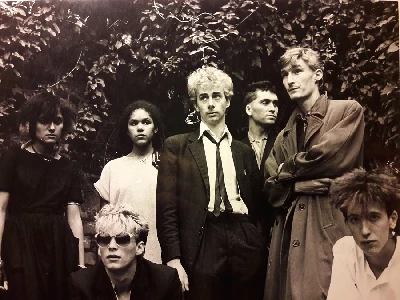
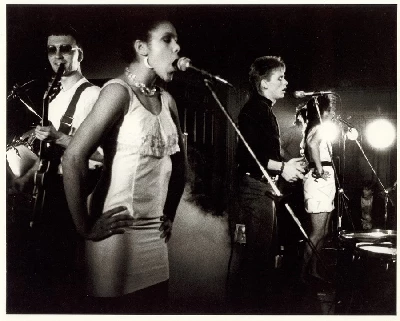
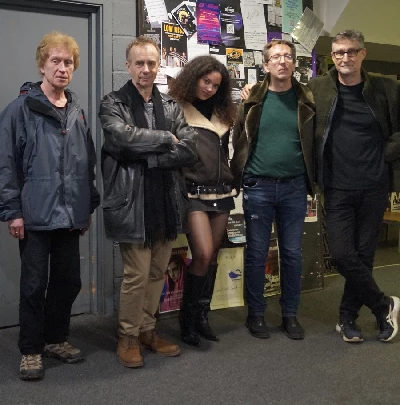
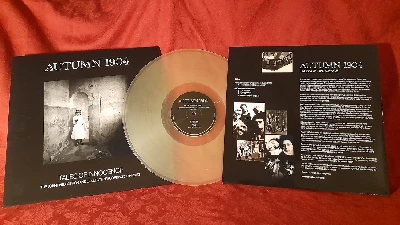
Visitor Comments:-
|
|
6255 Posted By: Alan McEwan, Edinburgh on 22 Mar 2024 |
Superb interview thanks
|